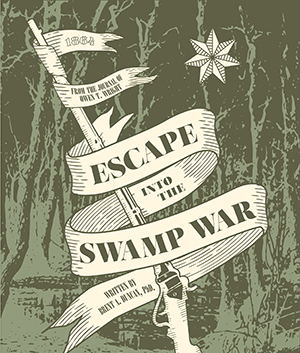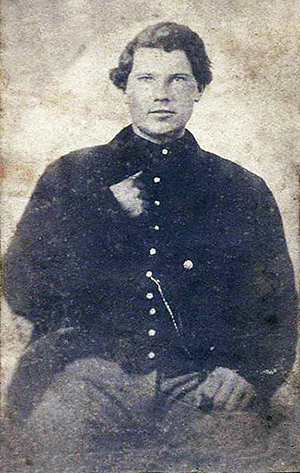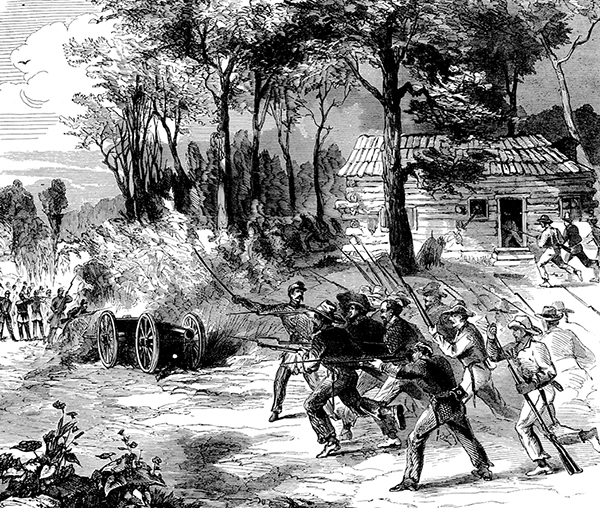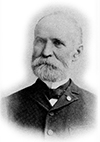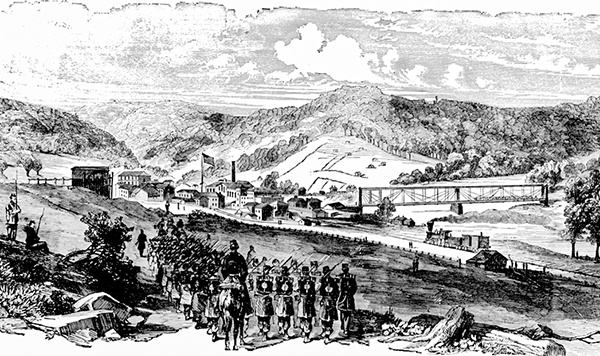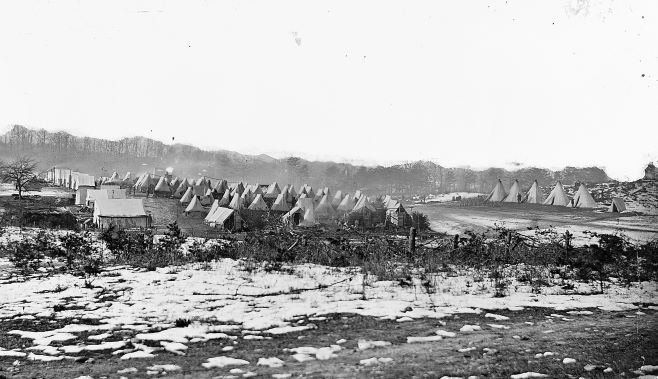The Shenandoah valley would host some of the ugliest battles of the war. In their pursuit of Stonewall Jackson's troops after the Battle of Winchester Heights Owen and his companions march hundreds of miles up and down the Shenandoah Valley, stopping only to fight their enemy or to tend to their bleeding bare feet.

Prelude to Battle of Winchester Heights (Kernstown)
Shields took his division on the offensive to expel the Confederates from the Shenandoah Valley.General Thomas Jonathan Jackson established his Rebel command in Winchester, a pleasant colonial town that was the hub for nine important roadways. Due to its strategic importance, Winchester would become a hotbed of battles throughout the war, changing hands no fewer than 72 times. At the time Owen’s journal picks up, during the first in this series of entanglements, the rebel force at Winchester was greatly reduced because most of the Confederate short-term enlistments had gone home. Despite being greatly outnumbered, Jackson prepared to stop Shields’ 18,000 troops from advancing on Virginia.[1]
On March 22nd, Jackson’s 4,200 troops were stationed on the hills above Winchester to meet Shield’s advancing division. The 14th Indiana moved to Strasburg Turnpike to confront Jackson. General Shields was injured in the ensuing battle. While being removed from the field, Shields passed his command to Colonel Nathan Kimball.[2]
Owen’s narrative begins again at this point.
[1]Clark, Champ, Decoying the Yanks, 43-4. Time-Life Books, Hereinafter referred to as Decoying the Yanks.
[2]Battles and Leaders, 302 - 313

March 23, 1862
Battle of Winchester
…In the meantime Gen. Tyler's Brigade of the 5th Ohio 62nd Ohio, 7th Indiana and 84th Pennsylvania advanced on the left flank of the enemy and the fight commenced in good earnest. Our troops gave a yell as they came on to the rebels. The battle waxed hot and the 14th was ordered to support Tyler's brigade. When we came up the 84th was retiring in confusion and the air was almost black with balls. The first fire both our color bearers were shot down at the same time some of the privates as well as officers shouted forward 14th! The boys thinking it was from headquarters advanced double quick amidst a shower of balls. It acted electrical for the enemy began to run and we followed them up. There cannon of which they had several a short distance was taken away in double-quick time. Here the enemy got a regiment or so of reinforcements and made another stand. The field over which we had fought was literally covered with dead and wounded. The groans of the wounded could be heard above the din? of battle and the shouts of the soldiery.
The rebels were now pouring a destructive fire into our scattered columns but it did not last long for the Gallant 13th came up at the same time our infantry on the right flanked them and they retired in utter confusion. Our Cavalry followed and captured two or three hundred prisoners. They left about 400 dead and wounded on the field besides a great many taken off in the fight. Our loss in killed and wounded is not far from 300.*
From the time the musketry commenced till the enemy were routed was 2 hours 30 minutes. We also captured 4 pieces of cannon. Many brave officers fell among whom was Col. Murray of the 84th Penn. There were seventeen shots in our regimental flag and a company flag also had the point shot in two. Our brave Catterson had his horse shot under him four balls hitting his horse, two, his saddle blanket, and one in the front part of the saddle. Samuel Keller a Corporal in our Company was killed in the last part of the action and James W. Quillan was wounded. Many of the boys had their clothing shot full of holes, by the musketry. Several hundred guns with sword bayonets were captured which the enemy threw away preparatory to running. Nearly all the regimental flags were shot full of bullet holes. The enemy had at least 1000 men placed "hors de combat." We lay that night on the field of battle.
[*The Union's total loss for the battle was 590: 118 killed, 450 wounded, 22 missing. The Confederate loss was 718: 80 killed, 375 wounded, 263 missing. B&L 2 307]
Postlude to Battle of Winchester
Shield's troops were jubilant about standing against the famous Jackson. However, what they did not realize is they were far superior in men and firepower to Jackson's 4,200 ragged troops.Kimball hurled continuous waves of manpower against the Stonewall Brigade, but Jackson's troops held their line. When the Union kept pouring onto the field in seemingly endless numbers, and the Confederates started running run out of ammunition, the Stonewall Brigade began a hasty retreat. Enraged that his men were retreating, Jackson shouted, "halt the rally!" and ordered a drummer boy to "Beat the rally!" As bravely as the lad pounded, the Confederates retreat increased its momentum as the relentless Federals approached.[1]
General Shields received credit for being the only Union general to defeat Jackson so handily. However, he spent most of the battle in a hospital bed. Kimball commanded the victory by ignoring the commands of his leader. He wrote that Shields "could not comprehend the strength of the enemy nor the position held by the respective forces…from his bed in the city five miles to the rear." Kimball was promoted to Brigadier General as a result of the battle of Winchester.[2]
As the Union pursued the retreating Confederates, Owen was about to become involved in one of the greatest cat-and-mouse games in military history. Jackson's Shenandoah Valley campaign had begun.
[1] Decoying the Yanks, p 70-71
[2] Battles and Leaders 2,1 p 302-313.
March 24, 1862
Pursued the retreating enemy to Newtown 15 miles from Winchester and camped. Here is where the rebels burnt a bridge to prevent pursuit when we followed them on the 18th here a few shots were exchanged.

March 25, 1862
Crossed the creek and pursued the rebels to Strasburg. We found a man with a hole big enough through his breast to see daylight through him. A cannonball passed through him and the enemy did not take time to bury him.
Every now and then boom! boom! the cannon would sound which was caused by the rear of the enemy and our advanced guard. We followed them five or six miles beyond Strasburg when we returned to the latter place.
March 26, 1862
We slept very cold last night in sheets made of rails and straw without blankets. Our tents will be on tomorrow. We have been in them but two nights for over one week. Our men also captured two more pieces of cannon on the 24th.
April 1, 1862
Started with two days rations today towards Woodstock on the way to Stanton 12 miles distant where the rebels were supposed to be camped.
The 1st Brigade took a back road out to the right of the railroad which comes into the main pike at Woodstock. We saw several secesh and took several prisoners before we got to Woodstock.
When we came to the last-named place the main body of the army was passing through. We had not got far till we heard the booming of cannon in front several miles.
After marching three or four miles beyond Woodstock we halted in the woods and built temporary sheds to shelter us in the night. A mile beyond us was a creek opposite a small town over which the rebels had burnt a small bridge. On the other side on the opposite hills were the rebels.
April 2, 1862
Remained camped in the woods all day while occasionally a cannon could be heard belching out death and destruction.
April 3, 1862
Still in the woods. It is not known why we remain here so long.
I understand that orders have been sent back to bring up our tents. There is a great many regiments on their way here which is probably the reason of our delay.
I took a little walk out today and could plainly see the rebels on the opposite hills.

April 13, 1862
Today Gen'l Shields division was out in line of battle and he rode before us in a buggy not being able to ride yet. His arm is getting better and will soon be able to lead us into battle.
April 14, 1862
Ordered to be ready to march at 1 O'clock with three days rations and blanket slung. After remaining in line for three or four hours the right-wing was ordered to go and get their pay which we received about 10 O'clock in the night. It is reported that John Benham, Waggner, and Riley Beal both of this company have been taken prisoners with several others who were out hunting forage.
One of the rebel cannon were run out and fired at us today but two dozen shots or so from our batteries made them seek safer shelter.
It is reported that they lost one cannon and fifteen men killed and wounded.
April 15, 1862
The left-wing this morning after getting their pay went out in a scout.
April 16, 1862
Today some of our men captured one whole company of rebel Ashby's Cavalry who were at breakfast and were taken by complete surprise. Got orders to be ready with three days rations about noon.
Started late in the evening for Mount Jackson. Traveled all night and reached Mount Jackson in time to prevent the destruction of the fine bridge over the Shenandoah.
Capturing Asby's Cavalry
Banks had decided to seize the crossroads at New Market. On April 16, Federal cavalry rode up Stony Creek. It crossed at a place where Turner Ashby’s cavalry had failed to post pickets. The Federals captured 60 surprised Confederates while they ate breakfast. [1]
While Owen marched toward Mount Jackson, the next day, Banks threw infantry across Stony Creek, which — swollen by rain — was nearly impossible to cross. Federal cavalry galloped across a burning wooden bridge that had been set aflame by Ashby’s troopers.[2]
The Union troops chased Ashby’s troopers back to Jackson’s line at Rude’s Hill. Among the last to reach the cover of Jackson’s troops, Ashby fell dead of a bullet in the lungs, his white stallion drenched red with blood.[3]
[1]Decoying the Yanks, 86-87
[2]Battles and Leaders 2,1 p.308
[3]Decoying the Yanks, 86-87
April 18, 1862
Halted. Got dinner and advanced towards the rebels who were supposed to be posted a mile distant on a hill across the valley. There had been a great many cannon shots fired but when we advanced in line of battle it ceased and the rebels continued their retreat commenced a month since. Camped near New Market a respectable little town about 45 miles from Stanton.
April 18, 1862
Moved to the right about a quarter from New Market and camped.
April 19, 1862
Nothing of interest today. Will stay probably for some time.
April 20, 1862
Sunday. It rained yesterday and almost all last night, causing much inconvenience to us. Our tents being back at camp. We have sheds as usual made of pine boughs and covered with our oil blankets.
April 25, 1862
Struck tents this morning and moved five miles towards Staunton.
April 27th, 1862
Sunday. Packed up and moved about 6 miles farther on the road to Stanton.
It is the most beautiful place here that I ever Saw. The Shenandoah Valley cannot be beat for beauty in the world. Tremelin, our 2nd Lieut. from Germany says this is the most beautiful spot of ground he has seen in any state in America.
April 30, 1862
Today we were mustered in again and we have two months more pay due us.
May 1, 1862
Set in rainy this morning and continued almost the whole night.
May 2, 1862
Our Comp. was detailed this morning for picket and were out on our posts by 11 O'clock. It is really a beautiful (sic) day and everything looks very romantic. We are camped about halfway between the Allegaineys (sic) and Blue Ridge Mountains. We heard occasionally discharges of artillery this morning but now all is calm.
We were told to be on our guard as the enemy were trying to draw our attention to the front and then come this road and attack us in the rear. We shall see what we shall see.
May 3, 1862
Ordered to have everything ready for a move.
May 4, 1862
Three days rations with knapsacks ready.
May 5, 1862
Started this morning back towards New Market and camped in four miles of the town. After getting comfortable to bed we were aroused by the report that Sullivan was attacked and the 1st Brigade formed and marched to New Market taking the road to the right that led over the Blue Ridge. We camped at the foot of Blue Ridge.
May 6, 1862
We are still here this morning waiting for orders. Genl. Williams division passed through the gap before day this morning. There is strong evidence to the effect that the enemy intend flanking us by way of this gap.
May 12, 1862
Orders to march this morning by 12 O'clock. Started at the appointed time and crossed a spur of the Blue Ridge after which we wended our course towards Front Royal which is on the railroad between Manasses and Strasburg. Camped at Luray after marching fifteen miles.
Marched nineteen miles and camped for the night in six miles of Front Royal.
May 14, 1862
Came into Front Royal this morning. It has been raining all day and is very disagreeable. We are in sight of town. It is a matter of conjecture as to where they are going to take us to. Some say we are reinforcements for Mc Dowel, and Mc Eldan and some think we are going to reinforce Burnsides or Butler. Something grand is going to be done in the strategic line or some tall running is evident. I think the war is virtually over and there is nothing much to do but to clean up the rubbish.
May 16, 1862
Left Front Royal this morning for Warrenton Junction. Crossed the Blue Ridge and camped after marching about ten miles.
May 17, 1862
We marched through a beautiful country today near the source of the Rappahannock. After marching about fifteen miles we camped near a little village called Waterloo but did not meet with the resistance that Napoleon did, for we took the town at a right_shoulder shift.

May 18, 1862
Crossed the Rappahannock this morning which is a very beautiful stream but very small compared with the father of waters. There was a steam mill situated upon its banks with an unusual large smokestack, and upon the last point was written "Southern Independence." I tell you we would have brought it down double quick if we were allowed so to do.

We came into Warrenton a little after noon. This is a very nice little place but we met with very few smiling faces except from the colored element—which predominates greatly over any other. The road was lined with negroes who greeted us right lustily. I declare I would not live in such a place and I do not believe that Southern Society would agree with me at all.
While passing through town one negro wench exclaimed Law Massy ain' they the pleasingest set of souls you ever saw.
We camped about two miles east of town.

May 19, 1862
Got to Catlets Station a little after noon and camped once more beside a railroad which is the Manasses railroad. This place is about 8 miles from Manasses Junction between there and Warrenton Junction.
May 21, 1862
Marching again today in the direction of Fredricksburg. After marching about half way we camped for the night. It is an uncommon level country through which we are passing and it si also uncommon poor land, nothing growing but grass and a little wheat now and then.

May 22, 1862
Reached Fredricksburg today or rather Falmouth, Fredricksburg being on the other side of the river. I tell you we were a rough-looking set of fellows all covered and dirty with sweat and dust we looked more like Indians than Hoosiers and Buckeyes.
We camped east of Falmouth on the north side of the Rappahannock.
May 23, 1862
Today I had the exquisite pleasure of seeing Old Abe and Secretary Stanton. Late in the evening we were reviewed (that is Shields Division) by him but is was so late that a person could scarcely see.
May 25, 1862
Marched this morning for Manasses Junction. Camped about halfway between Fred'b'g and Catlett's Station.
May 26, 1862
Reached Catlets Station this evening and took the road to Manas J. Camped 8 miles from the Junction.
May 24, 1862
Reached Manasses Junction about noon. It is very rolling ground here and every little nole (sic) had large earthworks on it which the rebels had constructed in the Spring of '61. General Geary's troops retreated to here a few days since and something stirring may transpire soon as Jackson has driven Banks almost out of the Shenandoah Valley, which we obtained by the battle of Winchester and the Strategy of Gen'l Shields. General Shields has gone to Washington and Kimball has command for the present.
We left Manas J. a few moments after we got there. Consequently I did not have much time to look around. This evening we took the road towards Strasburg and traveled thirteen miles before camping.

May 28, 1862
Passed through Thorofane gap this morning. The country from the junction to here is very poor and the soil is scarcely rich enough to raise beans. In the evening we passed White Plains. The scenery is more magnificent as we near the Blue Ridge. We have been without tents now since the 12th of this month, two days before we left New Market. We have also followed the railroad since leaving Catlets Station but "Narry ride." Camped near Rector Town.
May 29, 1862
"Beautiful morning this." A rail road train came down from the Junction or rather a Locomotive which it was. Shields Division has four Brigadier now, besides the artillery and Cavalry amounting in the aggregate to about 20,000 men.
We have been living on half rations for some time owing to difficulty of getting it up or to the thieving propensity (sic) of the Quarter Master.
Alas! how much grub comes up missing under this last head (drawn hand) "Quarter Master." I have seen the time on cheat Mountain when I would give a dime for a hard cracker but we was tolerable well satisfied for we thought it was as good as allowed us, but we have learned better since then.
It is a scandal and a shame the way we were treated. We charge it to T. C. Bunton who was Quartermaster 14th Regiment. I have no doubt but that the devil will roast him when he gets him, and from these accounts he certainly will. Even the devil should be ashamed of him.
This evening the drums beat the alarm and orders were immediately given to fall in with blankets slump and what rations we had on hand. We started about sundown in the direction of Front Royal. We marched about eight miles that night and camped within about twelve miles of Front Royal.

May 30, 1862
Battle of Front Royal
Early start this morning. Passed through Markha? which by the way has been a thriving little village but now mostly deserted. We expected to have a considerable fight at this place for it was represented that there was a considerable force here.
We got in sight of Front Royal till a few shells could be thrown in to stir up the rebels.
The 4th Ohio. took to the right. The 8th Ohio. to the left and the 14th to the front. The rebels however skedaddled and our Cavalry after them. A short distance from town our cavalry came up with them and a considerable little skirmish ensued. We took about 150 prisoners one a Lieut. of Cavalry besides a great many of our own men that we captured which the rebels had taken in their descent upon this place some days since. Jackson is at Winchester with it is supposed 40, or 50,000 men. Banks has retreated from New Market to Martinsburg and is now holding him in check till ours and Fremont's Divisions can close in and bag him.
The citizens state that there was a battle at Charlestown day before yesterday and that Banks was whipped but that Jackson fell back to Winchester again. It is evident that he got the worst of the fight—for the simple reason that he fell back to Winchester. There will certainly be some desperate fighting or some fleet running done in a few days and in the meantime we are anxiously waiting for news from Richmond and Corinth if our men are successful at both the rebellion is wound up if we fail it will add 6 months or one year to the war.

May 31, 1862
There was tremendous thunder, lightning, and rain last night. This evening there was some cannonading between our advance and the rebels on the Winchester. Several of our men were killed and wounded.
June 1, 1862
Sunday. This morning heavy cannonading is heard in the direction of Strasburg which is about ten miles up the river. Fremont is reported to have been at Strasburg on yesterday evening and him and Jackson have opened the ball. Mean while Banks I suppose will push up from Winchester and McDowell and Shields will be heard from this point.
It is now almost noon and the cannonading continues very rapidly at intervals. We have every thing ready to move and are in good spirits.
A little after noon we fell into line and marched toward New Town. We had got but a few miles out when the joyful news came to us that Banks had whipped (sic) Jackson. The consequence was we about-faced to Front Royal and took the road we had traveled from New Market to here. Some fifteen or eighteen Regiments passed on before us and the first Brigade followed. It is the intention to cut off Jackson, Banks pushing him towards New Market. Four or five miles out we camped on the south branch of the Shenandoah. It rained very hard in the evening but cleared off a little after dark. In the night however a terrible hard rain came up and the consequence was many the boys were drenched to the skin.
June 2, 1862
The first Brigade guards the train today. We had not marched very far till heavy cannonading was heard west of us in the Shenandoah Valley.
The firing was very rapid at times but in an hour and a half it died away and I suppose Jackson is trying to hunt his hole and if he is not very expeditious we will bag him and his whole force so mote it be.
This is a powerful hot day and a great many soldiers are utterly exhausted.
June 3, 1862
Came to Luray this evening and camped to the left of town on the pike. The bridge over the south branch of the Shenandoah is burnt and it will be some days before we can cross. It is a very large bridge and is only a few miles from town.
June 4, 1862
Still here. It is raining today and is very wet.

June 8, 1862
Battle of Cross Keys
Sunday. Ordered to turn every thing over to the commissary except utensils and one blanket slung with oil cloth. I being without shoes was left with others at Luray with the baggage. The 3rd and 4th Brigade was up the river to the bridge opposite (sic) several miles to Harrisonburg.

Jackson had to come this way if to retreat. He lay somewhere near Harrisonburg and on Sunday Fremont attacked him and fell back to get Jackson to follow him. However Jackson retreated to the bridge and almost annihilated the 3rd & 4th Brigades before Fremont came up. They tell me that it was a most desperate fight, our men charging bayonets after every cartridge was shot away. The 7th Indiana shot away all their cartridges and not having time to put more in their boxes they filled their pockets. Our men however had to retreat or be captured, doing so in splendid style, some bareheaded some without guns, some without accouterments and so on, etc.
We left 9 pieces of artillery and all the dead and part of the wounded. Col. Carrol of the 8th Ohio was in command acting as Brigadier General. It is said he led three charges once with the banner in his own hands. The 1st and 2nd Brigades were ten miles down the river and could not render any assistance. However Fremont arrived at the bridge (It being then burnt) and camped that night.
On the field of battle, I understand that he took back the 9 pieces of the 3rd & 4th Brigades with several others, We captured fifty prisoners who I was guarding when the troops arrived on the 11th. The next morning I joined the company near where they were camped on Sunday morning.



